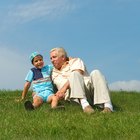Hispanic people are historically very family oriented. The needs of the family are more important than the concerns of the individuals, and the individual's self-esteem and identity is strongly affected by his or her relationship with family members, according to Utah State University's Cooperative Extension. Each member of the family has a role to play; while changing gender roles have affected the Hispanic community, there is still an emphasis on traditional values, according to Charlotte Shoup Olsen from North Carolina State University.
Father
The father occupies a position of respect and authority. The traditional view of manhood is strongly influenced by machismo, which Linda Skogrand, Extension Family Life Specialist at Utah State University, defines as the belief that men should be strong, brave and honorable; they should also protect and provide for their families. Machismo places men over women and gives males rights and privileges denied to women, such as independence and authority, according to the College of Education at the University of South Florida (USF). Many Hispanics in the United States no longer hold to traditional views of machismo, however, and instead share power equally within the marriage relationship.
Mother
Mothers in Hispanic culture are the caregivers. Motherhood is highly valued, and families expect women to care for children as well as elderly family members. Marianismo is the female version of machismo, states Skogrand; marianismo is the belief that women should be religious, giving and attentive to the needs of their household. While most Hispanic women work outside the home, they still must fulfill their traditional role. Their role is to nurture while the father is the main disciplinarian. Hispanics traditionally put the role of parenthood over the roles of wife and husband, according to Skogrand, and children are central to the Hispanic family.
Children
According to the College of Education at USF, Hispanic families raise children with certain expectations. Parents expect them to be responsible and cooperative and teach them not to talk too much to authority figures and to exhibit emotional restraint. Families expect children to consider the needs of the group and to value interpersonal relationships. Parents are concerned about their children's happiness and enjoyment and are not likely to attend events where the children are not included. The close relationships with extended family, which are typical within the Hispanic community, can help protect adolescents from negative peer influence, according to the National Institutes for Health.
Extended Family
Familism, the concept of family, is central in the Hispanic community and extends beyond the nuclear family to include grandparents, aunts, uncles and cousins; friends and neighbors; and organizations that are important to the community, such as churches, according to Skogrand. Familism has three main aspects, according to the National Institutes of Health: family obligations; support and emotional closeness; and family as referent, or the need to live up to family expectations. Elderly grandparents sometimes live with the family, and there is frequent visiting among family members. All life events are viewed as occasions to gather and celebrate.
Related Articles

What Is the Proper Way to Get Married ...

Wedding Etiquette for Stepparents

The Emotional Effects on the Father ...

The Meaning of a Flower Girl in a ...

Groom's family wedding etiquette

How Absent Fathers Affect Men

Importance of Father & Son Relationships

The Norwegian Dating Culture

Wedding Etiquette for a Step-Grandmother

What is the Typical American Family?

What Is the Symbolism of Jumping the ...

Marriage in Mexican Culture

What Do the English Wear to an Amish ...

Types of Communication Patterns in ...

How to Court a Christian Girl

A Brother's Influence on a Younger ...

How to Word a Family Unity Sand Ceremony

Reasons Why Women Get Married

Differences Between Modern & ...

What Is a Caregiver's Authorization ...
References
- University of South Florida College of Education: Understanding the Hispanic/Latino Culture
- North Carolina State University: Department of 4-H Youth Development and Family and Consumer Sciences: Cultural Implications and Guidelines for Extension and Family Life Programming with Latino/Hispanic Audiences
- Utah State University Cooperative Extension: Understanding Latino Families,
- National Institute for Health: Familism Values as a Protective Factor for Mexican-origin Adolescents Exposed to Deviant Peers
Writer Bio
Janet Clark has written professionally since 2001. She writes about education, careers, culture, parenting, gardening and social justice issues. Clark graduated from Buena Vista University with a degree in education. She has written two novels, "Blind Faith" and "Under the Influence." Clark has received several awards from the Iowa Press Women for her work.